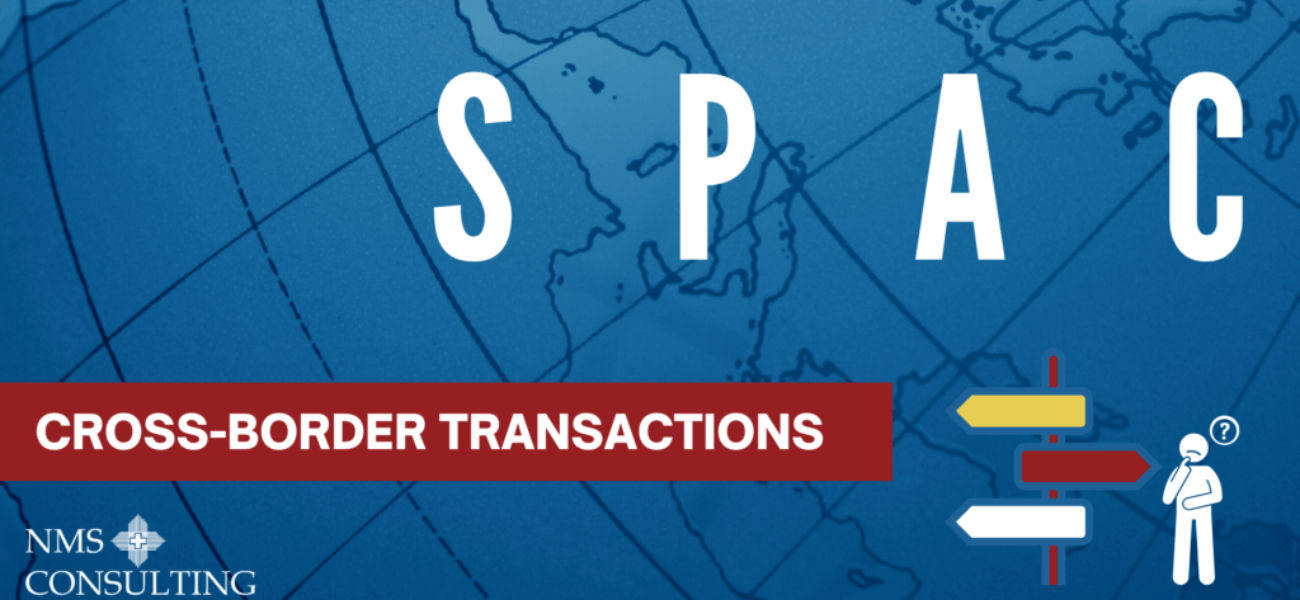Are SPACs a Good Option? | Consultant Insights | NMS Consulting

Foreign targets are looking to merge with U.S. based SPACs to have access to the liquidity and efficiency present in the U.S. market.
The interest in SPACs outside of the US has been strong, and it is a result of an ‘overflow’ effect where the US interest in SPACs spilled over into other countries. Interest in Europe is very high currently due to the receptive regulatory environment there, and the ability of a European SPAC to operate in a less-crowded market compared with the US. Specifically, Amsterdam has attracted several SPAC IPOs to date this year, because its regulatory rules are very similar to the US. Frankfurt is showing growth, but the legal structuring questions for SPACs in Germany present a hurdle.
The types of opportunities present are early-stage companies with significant intellectual property or growth rates serving as acquisition targets. These foreign targets are looking to merge with U.S. based SPACs to have access to the liquidity and efficiency present in the U.S. market. These companies have been reaching out to us with interest in a SPAC, as they want to leverage our domestic and international experience to ensure a successful transaction.
One example of a cross-border transaction was Netfin Acquisition Corp., a Nasdaq-listed SPAC, combining with Triterras Fintech Pte Ltd. This was an outstanding business combination, as Triterras has one of the world’s largest commodity trading and trade finance platforms, and the history of the Netfin team suggests they will be able to grow this platform exponentially and efficiently. These kinds of synergies are what make cross-border SPAC transactions interesting.
However, it is important to note that a potential risk and challenge for the target company is the substantial amount of time and resources for matters such as accounting and reporting. Also, SPACs must deal with complex valuation issues, risk of personal liability for the sponsors and board directors, and other regulatory requirements. Another risk is that the SPAC management team members are professional investors, but sometimes do not have expertise in the specific market segment in which the target company is focused. This can result in misaligned goals.
More key challenges are cultural transformation and operational integration, as two separate entities from different countries will be combining to operate as one public entity. Becoming and operating as a public entity presents a completely different atmosphere for the target company, and can lead to significant changes.
The regulatory environment is key, as we witnessed recently in the US. The tightening of regulations around SPACs has caused a decline in interest and transactions domestically for the time being. Regulations can change at any given time, so it is important to stay current with governmental entities and their stances on SPAC transactions. Market conditions do also play a significant role. As we saw earlier this year in the US, SPACs were getting tremendous investor interest for several months, but this interest has waned and now many SPACs are trading far below the prices they were at just a few months ago.
In regard to tax implications, we strongly advise legal, tax, and audit professionals to be hired during the SPAC process, to review all potential tax liabilities. Cross border deals are made much more difficult specifically due to tax laws, as well as due to regulatory rules.
Along with the challenges and risks mentioned earlier, I believe it is imperative that the sponsors are carefully vetted by potential investors. Due diligence is a tremendously important tool when determining whether to invest in a cross-border SPAC. Until the De-SPAC process takes place, an investor is basing their decision solely on the SPAC sponsors’ history and track record in a different country. Meeting with the sponsors, discussing philosophy and long-term strategy, are all key components of ensuring a successful deal. To best maximize opportunities and manage challenges, we suggest sponsors and investors identify advisors and other service providers to help during the process, as it is better to invest in the proper preparations now, rather than must unwind or run into significant hurdles later.
How NMS Can Help
NMS Consulting advises corporate clients on creating value through SPACs by drawing upon our team’s extensive transactional expertise. Our services for target companies who are seeking to be acquired by a SPAC include:
- Preparation for being a public entity (due diligence, financials, tax structuring)
- SPAC Sponsor Group identification
- Structure negotiation
- Internal controls, governance, and review
- Addressing regulatory and compliance requirements
Our services for SPAC Sponsor Groups include:
- Structuring
- Management Team Composition
- Target identification and acquisition
About the Author

Dr. Harry Moore MBE is the Head of Europe, Global Head of Turnaround and Transformation. His experience and expertise include international strategy, corporate turnaround, transformation, market penetration, and increasing profitability. Prior experiences include leading business transformation teams at both KPMG and PwC, and being sponsored by the UK Government to manage initiatives that he designed to secure the future of enterprises in the SME sector in the UK. His strategies resulted in saving roughly 135 UK businesses.



